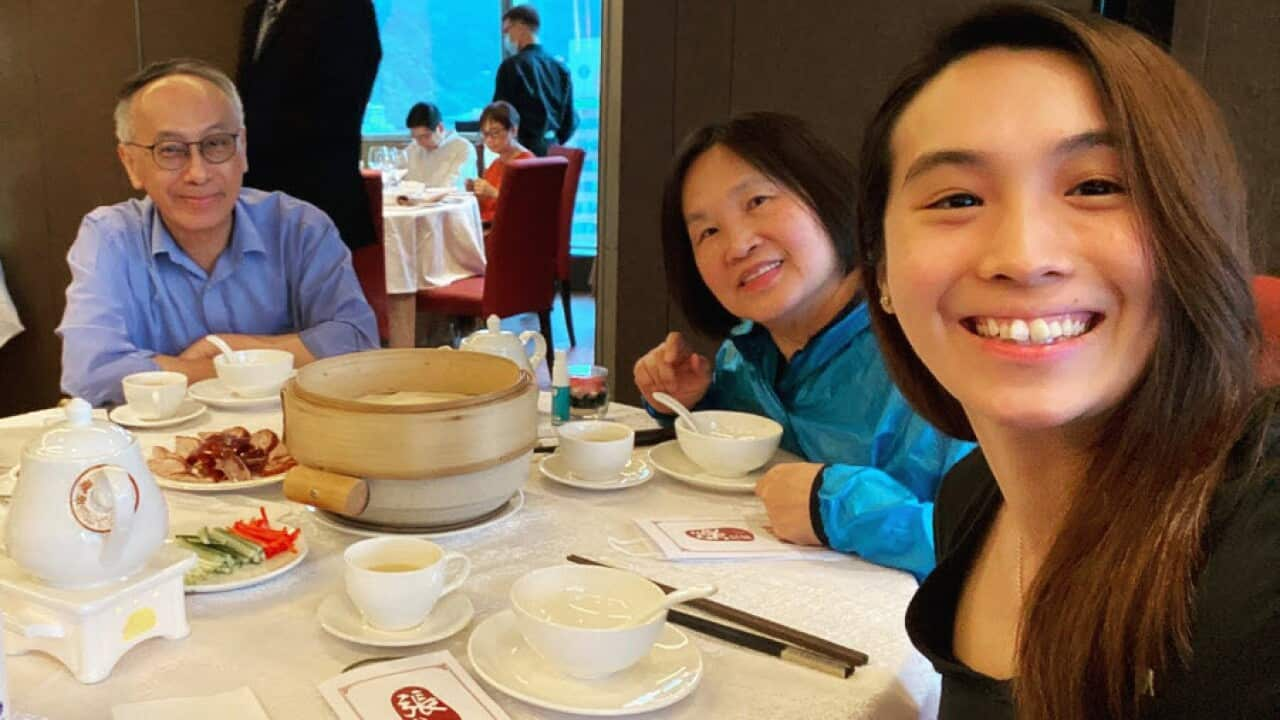Insight's episode Sorry, Not Sorry examines the power of an apology – why we seek it, what happens when we get it, and the consequences when we don’t. Watch on .
The word "sorry" was seldom uttered in Eunice Cheung’s home.
“Apologies were non-existent. If we’d had a disagreement my mum would bring me some food or sliced fruits as her way to apologise for lashing out at me during an argument.
"There wasn't really the language or the vocabulary to say, 'I'm sorry'."
Eunice grew up in Hong Kong. She told Insight that in her culture there is an unspoken Asian hierarchy where huge emphasis is placed on respecting elders.
“Whoever is older, especially a parent, is automatically seen as knowing more. If they were to apologise for their behaviour, it would appear that they’ve lost their authority.”
Eunice recalls arguments with her mum, but while she would say sorry afterwards, her mum would say nothing.
Over time, her parents' inability to say sorry took its toll on her.
"I think for me, apologising would signify acknowledgement.
“It was really hard just pretending like nothing had happened. I remember feeling quite sick and resentful,” she said.

Eunice Cheung as a child with her mother. Source: Supplied
From no apologies to unnecessary apologies
Shona Hendley has never struggled to say sorry. In fact, she regards herself as a serial apologiser.
“I apologise a lot, multiple times a day, in every form of communication. I apologise for someone bumping into me, if a guest arrives late to our house," she told Insight. “We had a grocery delivery and we got broccolini instead of broccoli and I apologised to my husband.
"He questioned why I was apologising, when it wasn’t my fault."

Shona Hendley is a serial apologiser. She says she knows it's an irritating habit but that it comes from a feeling of empathy. Source: Supplied
“I think the record was 32 times in a week. I know it irritates people, but it’s just a habit that I think began because I’m an empathetic person, so whenever I feel bad for someone I apologise.
“Now I’m aware I do it, I’m working on it."
How to say sorry
Saying sorry can help to heal ruptures in relationships, psychologist Rebecca Ray told Insight.
“There’s no formula to making a good apology because it’s always person - and interaction - specific. But an apology needs to be genuine. If you don’t feel it, don’t say it," she said.
But while it needs to make amends for a wrong that's occurred, it doesn't have to be made face-to-face.
"Some people write beautiful apologies but can’t deliver them in person."
If you don’t feel it, don’t say it.Rebecca Ray
She said timing matters too.
“I don’t think you can say sorry too soon, but I do think it can come too late.
"Some people try to give an apology decades after the event when the other person has done their healing. This can make a person feel retriggered if they’re exposed to the person that created the hurt in the first place”.
Rebecca says over-apologising can be a coping strategy for some people.
“It’s what psychologists call fawning and what’s more colloquially known as people-pleasing. Some apologise to help restore peace to a situation when there’s no reason to apologise. In fact, the apology might really have been the other person’s to make."
The power of an apology
Rebecca has personal experience of the power of a heartfelt apology.
“At 33 I was still looking for the man of my dreams when I met a five-foot, ringlet-crowned muso chick called Nyssa who happened to be the person of my dreams.
"But after the initial six-month love bubble I started to experience what I think in hindsight was internalised homophobia, which really surprised me," she said.
For her, internalised homophobia meant that it was okay for anyone else to be in a same-sex relationship, but it wasn’t okay for her.
She says it was really hard for her to deal with those feelings and for a while she treated her partner Nyssa poorly.
“I was short with her and distant. I did my level best to make Nyssa leave”.
But through therapy, she started to work through some pre-existing trauma and started some conversations with Nyssa where she apologised for pushing her away.
"I was detangling myself from the rigid heteronormative picture that I had in my head, which was stopping me being able to enjoy the person in front of me," Rebecca said.
"Nyssa had done absolutely nothing wrong. In fact what she’d done, by sticking with me, was showing me that she loved me unconditionally and I’d never had someone do that before.”
Rebecca and Nyssa have been together for 11 years, and are now married and share a son.
“In our family, sorry is a word we use a lot. It brings us closer together and it’s something very important to model to our son,” Nyssa said.

Rebecca Ray says she treated her partner Nyssa poorly but after therapy started some conversations with her to apologise. Source: Supplied
Learning to apologise
Eunice now lives in Sydney and works as a psychotherapist. Last year she visited her parents in Hong Kong, determined to talk with them about the importance of saying sorry.
“Something shifted in me and I decided I couldn’t really pretend like nothing had happened anymore. I decided to address the elephant in the room with my parents about the fact that they never apologise.
"I said: 'look mum I want to talk about the way you sweep things under the rug'. That in itself is a very foreign concept for me as an Asian and for my parents as Asians.”
Her mum still hasn't been able to apologise in words, but Eunice says she has a different language when it comes to saying sorry.
A few days after that brief conversation Eunice said her mother came to her and said: “You know Eunice, your dad and I love you very much, and you know we may not have the words to show you that or to tell you that, but we love you dearly”.

Eunice Cheung says an apology has the power to validate your feelings. Source: Supplied
“At that moment I cried too because it felt that my mum was apologising in her own way.
"I realised I was holding on to so much anger and resentment from the past but those feelings started to disappear because my parents were showing me love in the ways that they could.”
Since that conversation, Eunice says her mother has become more confident at expressing her feelings – and apologising.
"She can own up and say, 'yes, you're right, I'm sorry, thank you for letting me know. And I apologise'.
"So it's really changed our relationship for the better.
"It's acknowledgement that she realises the things that she has done have hurt me. And, growing up from a place of not receiving much validation and acknowledgement, it meant a lot."












